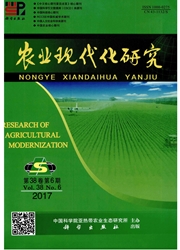

 中文摘要:
中文摘要:
中国粮食生产虽然实现了“十一连增”,背后却隐藏着许多危机,如何在实现粮食产量增长的同时又能保护农业生态环境,是当下中国面临的一个非常紧迫的问题。本文利用2002-2011年中国13个粮食主产区的省际面板数据,运用数据包络分析方法(DEA)对中国13个粮食主产区的环境技术效率进行了测算,并在此基础上运用计量分析方法探讨了城镇化、农村人力资本存量对粮食环境技术效率的影响。研究表明:城镇化水平对粮食环境技术效率具有显著负向影响,城镇化水平每提高1%,粮食环境技术效率会下降0.38%;农村人力资本存量对粮食环境技术效率具有显著正向影响,但是影响力度很小,农村人力资本存量每提高1%,粮食环境技术效率仅提升0.002 7%。
 英文摘要:
英文摘要:
Although China's grain production has achieved an "eleven-year consecutive growth", many crises remain. One of them is to balance grain production growth and protecting agricultural ecological environment. Based on the panel data of 13 main grain production regions in China fi'om 2002 to 2011 and applying Data Envelopment Analysis (DEA), this paper calculated the environmental technical efficiencies in these regions and analyzed the effect of urbanization and rural human capital stock on the environmental technical efficiency. Results show that urbanization has a significant negative impact on the environmental technical efficiency of grain production growth: when the level of urbanization increases by 1%, the level of the latter will decline by 0.38% and the rural human capital stock imposes some positive impact on the environmental technical efficiency but not very significant: when the level of rural human capital stock increases by 1%, the level of the latter will rise only by 0.002 7%.
 同期刊论文项目
同期刊论文项目
 同项目期刊论文
同项目期刊论文
 期刊信息
期刊信息
